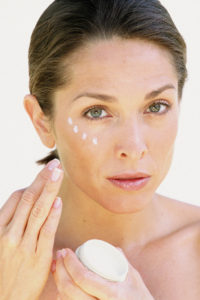
1) There is no magic single product that does it all. Skin care is a matter of selecting a handful (not a cabinet full) of good products that can perform the basic functions of cleansing, moisturizing, protection, exfoliation, and stimulation. No one product, no matter how many ingredients it may have, can do it all.
2) Products that contain collagen or hyaluronic acid can get into the skin to buildup it up and thicken it. This is a classic ‘trueism’, meaning it sounds like it should work so it does. There is no scientific evidence that large molecules like collagen or hyaluronic acid can get into the dense dermis which makes up about 95% of skin thickness. These product ingredients feel good to the touch and they do moisturize the outer layer (epidermis) but that is as far as it goes. Topical collagen can not make your skin have more collagen.
3) Organic skin care products are better than synthetic skin care compounds. This sounds good but it is far from accurate. Many organic products are far from natural and are misrepresented. But that issue aside, synthetic compounds can look identical to natural compounds and often are more potent. The issue should not be whether a compound is natural or synthetic, but how well does it work. Skin care and skin care products are attempting to delay and improve upon a natural process, aging. Most of the time it takes an unnatural or synthetic approach to really do so.
4) The higher the SPF rating, the better the product is for sun protection. This is true, but only slightly so. The majority of sun protection comes at the SPF 15 level. Moving up to SPF 30 increases protection only by an additional 2% and SPF 45 an additional 1%. It is fair to say that SPF protection above 30 is only important if you are going to be out in the sun a really long time. Also SPF only covers UVB rays, not the more harmful UVA rays. New sun protection rating systems, including UVA, are forthcoming.
5) Antioxidants can help make wrinkles lessen or go away. This is probably the most common current misconception patients have about skin care technology. Since antioxidants have come onto the skin care scene, newer ones appear every year and their promises are great. The reality is antioxidants help battle free radical formation, a primary cause of skin damage, but it can’t repair skin damage that currently exists. Only some form of physical manipulation, such as Botox, microdermabrasion, chemical peels, or laser resurfacing, can significantly lessen or improve wrinkles. Topical Vitamin A and C can offer mild improvement over time also.
Dr. Barry Eppley
Indianapolis, Indiana


